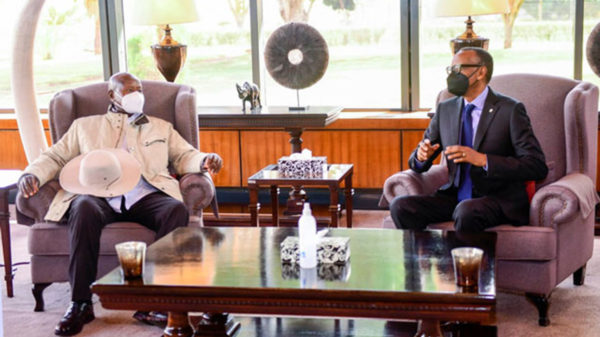Kenya exports much more to Uganda than the reverse, but it gets jittery every time Uganda’s exports seem to make a mark in its market. In recent years, it has blocked imports of dairy, sugar and maize from Uganda, leading to increasingly louder calls for Uganda to retaliate. We delve into the issues involved.
It looks increasingly unlikely that an agreement by Kenya to end the blockade on agricultural and processed agro-products from Uganda will be implemented. The bilateral agreement was signed on Dec 21, 2021 by Kenya’s Cabinet Secretary for Agriculture, Peter Munya, and his Ugandan counterpart, Frank Tumwebaze.
As partner states that have supposedly implemented the East African Common Market Protocol since 2010, Uganda and Kenya should not need any other bilateral agreements to freely trade with each other. But Kenya has got into the habit of blockading agricultural products from Uganda, citing different reasons.
The two ministers promised to remove tariff and non-tariff barriers targeting poultry and poultry products, and to provide import licenses to allow Ugandan sugar into Kenya.
Kenya also agreed to undertake a verification exercise of Uganda’s dairy sector during the last week of this month. The verification exercise, the ministers said, is meant to prove that Uganda is actually producing the milk exports to Kenya.
Kenya blocked some dairy products from Uganda in 2019. While several players, including those at Uganda’s Ministry of Trade, Industry and Cooperatives called for retaliation following Kenya’s decision, President Museveni insisted that this was a small matter that he would quickly resolve with his Kenyan counterpart, Uhuru Kenyatta.
Despite the Museveni’s promise, Lato Milk, which had become a popular brand in Kenyan supermarkets, has remained blocked from crossing the border into Kenya, costing Ugandan farmers, employees and Pearl Dairies, its producer, millions of dollars as the company had to close part of its plant.
“In the financial year 2020/2021, Uganda’s dairy sector lost $200 million in direct and indirect income,” says Bijoy Varghese, the general manager Pearl Dairies.
Kenya having blocked the importation of milk products from Uganda in 2019, the two countries have conducted several trade negotiations during which Kenya has promised to conduct at least two verification exercises targeting the dairy sector. But nothing of the sort has ever materialised.
David Birungi, a director at the Uganda Manufacturer’s Association, adds that even when such verification exercises are conducted, Uganda never gets to benefit because more trade barriers are again instituted.
“There have been so many verification exercises but never a resolution,” Birungi says.
A case in point is that of sugar, where several verification exercises have only resulted in sporadic sugar import permits from Kenya.
Since 2010, Kenya has routinely accused Uganda of repackaging imported sugar and then passing it off as being locally produced. This long-standing accusation culminated in Kenya banning the importation of sugar produced in Uganda in 2012. Since then there have been several blockades against sugar and sugarcane from Uganda.
In the latest blockade, Jim Kabeho, the executive director of Madhvani Group of Companies, says Kenya hasn’t issued any permits for companies to import Ugandan sugar since September 2021.
The sugar producing companies had received relief in April 2021, following a sugar verification exercise by Kenya.
Despite several agreements with Kenya’s president and other officials to allow for the free flow of goods between the two countries, Kabeho says sugar import permits have dried up for the umpteenth time, because national pride and Kenyan politics have been framed for the population to believe an increase in imports from Uganda suggests a failure by their government.
“Kenya has always thought they make better things and were surprised when Uganda was able to produce cheaper products,” Kabeho charges.
Another official who asked not to be name for fear of antagonising Kenyan authorities, claims that when trucks of sugar or sugarcane go through western Kenya, farmers there are slighted, which in turn galvanises politicians into complaining about cheap products from Uganda.
One such politician that has routinely complained about cheap goods from Uganda disadvantaging Kenyan farmers is longtime opposition politician and now pro-establishment presidential hopeful Raila Odinga.
Last month, during the launch of his campaign for a fifth bid for the presidency, Odinga promised to address the collapse of industries that used to absorb agricultural products such as tea, cotton and sugarcane.
Sugarcane is one of the major contentious agricultural products, as farmers in Western Kenya are usually unhappy with Ugandan farmers selling their produce to Kenyan factories. The unhappiness of Western Kenya farmers usually leads to sugarcane from Uganda being blocked.
Odinga also castigated ‘cartels’ that he claimed are destroying livelihoods for Kenyans in agriculture by importing maize “while farmers are stuck with maize”.
Since 2010, when the EAC common market protocol became operational, Kenya has been a major market for Uganda’s maize. But this changed in March 2021, when Kenya decided to block importation of maize from Uganda, alleging aflatoxin contamination.
Ugandan businessmen, on the other hand, alleged protectionism, arguing that the normal procedure under the East African Community arrangement should have been to test the maize and block the individual batches found to be contaminated with aflatoxin.
While Kenya has since reopened its border to maize from Uganda, thanks to negotiations between the two countries in April, members of Uganda’s business community, such as Birungi, feel there should be a long term solution that provides for consequences for any country in the East African Community that introduces tariff and non-tariff barriers against the existing agreements.
“We can’t do the same thing over and over again. The EAC should provide for a robust conflict resolution mechanism that is not beholden to any politician or individual,” Birungi says.
Birungi suggests that a tribunal with the ability to penalise offending partner states should be created to deal with countries that block goods from EAC member states in contravention of then terms of the existing protocols.
He says this is the only way to end the mistreatment of Ugandan businesses by countries of the EAC.
By providing for this tribunal, Birungi believes, countries can start to compete based on investment in improving agro-processing competitiveness instead of the current circumstances where goods are blocked at the whims of EAC partner states that are at risk of losing market because others in the region have a comparative advantage.
Others players, like Rebecca Kadaga, Uganda’s Minister for East African Affairs, however, believe in giving countries like Kenya a taste of their own medicine. As a politician from Busoga, Ms Kadaga has witnessed firsthand the impact of Kenya’s trade blockades as farmers in her district, Kamuli, routinely grapple with loss of income due to a glut in the supply of sugarcane.
As the most recent Speaker of Parliament, she was always on hand to demand a resolution whenever sugar or sugarcane was blocked at the Uganda-Kenya border. As Minister of East African Affairs, she became the first minister under Museveni to announce plans by Uganda to retaliate against Kenya to force fair treatment of Ugandan traders.
Uganda is the biggest market for Kenyan goods and a blockade of its exports to Uganda would potentially be costly for the biggest economy in East Africa. For a long time, Kenya has exported to Uganda much more value than it imports from it.
In financial year 1998/1999, for instance, Kenya exported to Uganda goods worth $149.3 million while Uganda exported to Kenya gods worth $38.7 million. But Uganda has been bridging the gap on its eastern counterpart over the years. In financial year 2017/2018, Uganda earned more ($678.5 million) from exports to Kenya than Kenya earned from exports to Uganda ($503.1 million). But the trend was again reversed in the years that followed.
Kenya exports to Uganda an assortment of manufactured products, but Uganda has been cutting off some products through import substitution industrialisation. For instance, Uganda used to import virtually all its plastics, mostly from Kenya, during Museveni’s early days in power. But plastics manufacturing in Uganda has since caught on, with even surplus for export.
Apart from manufactured products, Ugandans also import agricultural products from Kenya, including potatoes and mangoes.
That is why many don’t understand why Kenya keeps blocking Uganda’s products while its own enters Uganda unhampered. Kadaga, unlike the ministers that preceded her, has argued that Kenya’s blockade of Ugandan goods has gone on for too long, and that the best approach is to give them a taste of their own medicine.
Following Kadaga’s announcement cited above, and later the announcement of a blockade on some of Kenya’s agricultural products, Agriculture Minister Tumwebaze was invited to Nairobi for the negotiations mentioned above.
With Kenya slow at fulfilling its promise, however, Uganda’s next move is now unclear. We sent questions asking how the Ministry of Agriculture will implement their agreement with Kenya but no meaningful response came through.







